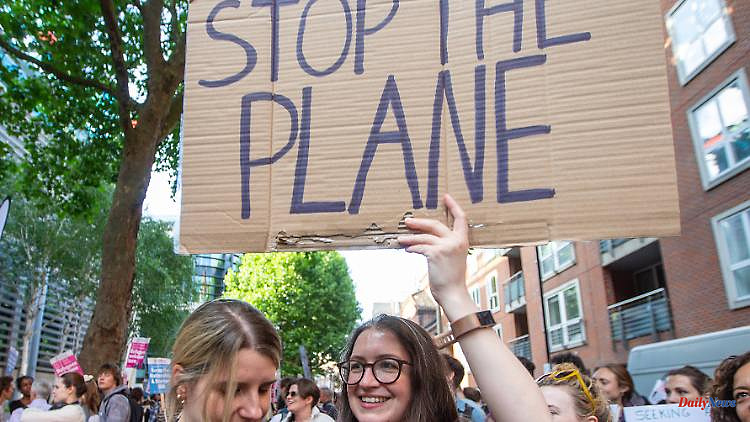The British government wants to get rid of migrants - and deports them to Rwanda. The deal with the African country is highly controversial, even the UN had complained about it. In vain, in the evening the first plane is allowed to take off.
The British government's plans for the bishops of the Church of England are a "disgrace to the nation", and the British heir to the throne, Prince Charles, is said to have called them "terrifying" in private - the royal family is obliged to remain politically neutral. What causes such a stir in the United Kingdom: the refugee deal between the government in London and that of Rwanda - migrants for money.
Activists tried until the last moment to stop the flight with a lawsuit. But the judges in London decided on Monday: The deportation of the asylum seekers from Great Britain to Rwanda can take place. The plane is scheduled to take off tonight, with fewer than a dozen migrants and refugees on board who were actually seeking asylum in England.
Originally, the British Home Office's plan was to deport 130 asylum seekers to Rwanda. They are not from there. Human rights organizations and the UN refugee agency UNHCR as well as the union of the British border police had filed a lawsuit. They argued that deporting people seeking asylum in the UK would breach their rights to protection and asylum. The government in London cannot adequately justify that Rwanda is a safe country for these people.
The original 130 asylum seekers are migrants and refugees who have crossed the English Channel from France in small boats in recent years. In 2021 alone, over 21,000 people reached the island via this route, most of them West or East Africans. This year there were already around 10,000 people. The British government's plan: to deport these people to Africa before they apply for asylum. The aim, according to the Home Office in London, is to discourage others from trying the same path. In this way, the smugglers should also be put under control. In addition, the high costs of accommodating asylum seekers - currently the equivalent of 5.6 million euros per day - are to be reduced by rapid transfers to Rwanda.
In April, British Home Secretary Priti Patel and Rwanda's Foreign Secretary Vincent Biruta signed the migration deal in Rwanda's capital Kigali, just two months before the small Central African country hosts the Commonwealth of Nations (CHOGUM), the most important international summit of Commonwealth nations and a prestige event for Rwanda. As a member of the Commonwealth, Kigali is struggling to shine in the best light: security, development, liberty and democratic rights are all emphasized.
The opponents of the migration deal see it differently. They argued in court that Rwanda, where long-time President Paul Kagame rules with an iron fist, is not a safe country. Opposition is hardly allowed. Kagame, on the other hand, defends the deal and emphasizes that "people are not being traded here", but: "We even help them". They would have a chance to start a new life in Rwanda. Joseph Rwagatare, Kagame's presidential adviser, accuses the suing NGOs in England of "inventing horror stories about Rwanda".
A judge of the High Court in London ruled last Friday that the deportation should go ahead. It is in the "public interest," the judge said, for the government "to be able to implement immigration control decisions." The plaintiffs appealed to the Court of Appeal. On Monday, the hearing showed that of the 130 asylum seekers, only eight remained with a so-called deportation document. According to the NGO Refugee Council, which represents the plaintiffs and insists on a ban on deportation, there are numerous minors among the 130 asylum seekers. These have now been exempted from deportation.
Rwanda's Foreign Minister Vincent Biruta stressed at the signing of the refugee deal that Rwanda "welcomes" this partnership with the United Kingdom: "This is about ensuring that people are protected, respected and empowered to pursue their own ambitions and settle down permanently in Rwanda, if you wish."
Rwanda's government, which has enormous deficits in the state budget due to the corona pandemic, will receive 120 million pounds, the equivalent of 144 million euros, from London. The so-called Economic Transformation and Integration Fund, which was set up in London for this purpose, is to be used primarily for secondary education, university and vocational training and language courses, not just for migrants. The country will benefit from this in the long term because the educational opportunities are also aimed at Rwanda's youth, according to the government in Kigali.
Rwanda, in turn, guarantees migrants work permits and free access to health care should they decide to stay in Rwanda. In the long term, start-ups of young entrepreneurs are also to be supported from the fund, especially in Rwanda's rising tech scene. The small country with around 12 million inhabitants is struggling with high youth unemployment.
Rwanda has repeatedly presented itself as a host country for migrants in recent years. Around 120,000 refugees are currently living in the country, mainly from the neighboring countries of Burundi and Congo, in more than a dozen camps across the country. Like President Kagame himself, most Rwandans grew up in refugee camps in the region or in exile. As early as the late 1950s and 1970s, there had been pogroms against the Tutsi minority in Rwanda, to which Kagame also belongs. The genocide of over a million Tutsi in 1994 triggered one of the continent's largest waves of refugees.
Taking in refugees against development aid - this plan has met with widespread criticism. The UN refugee agency UNHCR spoke of a violation of the UN Refugee Convention. 160 British aid organizations unanimously declared the program "shameful and cruel". They estimate the true costs at up to the equivalent of 1.7 billion euros per year.
UNHCR's criticism of the British-Rwandan agreement contrasts with UNHCR's own similar stance. Since 2019, UNHCR charter flights from Libya have landed in Kigali every few months. On board: migrants and refugees, mostly from West and East Africa, evacuated by the UNHCR from Libyan camps. In November 2021, Rwanda, the African Union (AU) and UNHCR extended the relevant agreement until the end of 2023.
So far, more than 1,000 people have been flown to Rwanda in this way - most recently in early June. They have the choice of staying in Rwanda, returning to their home country or being relocated to another third country. 70 percent choose one of the latter two options, i.e. leave Rwanda again. According to UNHCR in Rwanda, 629 refugees were resettled in various countries in Europe and Canada. The remaining people "go through various case studies," according to the spokesman for the aid organization.
Around 370 migrants are currently living in the UNHCR detention center in Gashora, around 60 kilometers outside the Rwandan capital Kigali. Most are awaiting a commitment from third countries to be resettled there. According to UNHCR, this is a measure of "emergency humanitarian aid for the dire and life-threatening conditions". Refugees and asylum seekers give their consent before they are evacuated. This is not the case in the migration deal with London.












